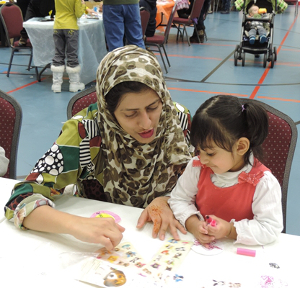Lloydminster and Area (ECD) Community Coalition
Lloydminster and Area Early Years Coalition
 |
Community at a glance
EDI baseline results
Strengths
- Service providers are used to working collaboratively in order to meet resident needs and government requirements in a community that straddles two provinces.
- Service providers and community members have worked together in the past on issues related to young children. National Child Day has been celebrated in the community since 2003, for example.
- The coalition meets every month and has a core membership of more than 30 people with a broad range of skills and perspectives. Members represent school districts, public health, Parent Link, parents, home visitation and early intervention programs, play schools and daycares, Alberta Child and Family Services, the library, parks and recreation, Lakeland College, immigrant settlement services, community and cultural services and the Chamber of Commerce.
Challenges
- Meetings are held during the day which means that many parents and caregivers are not able to attend.
- Keeping focused when there are always new ideas being generated.
Coalition actions
 |
National Child Day activities (November 23, 2013) attracted more than 350 people. The coalition rented the two local field houses, created play-based, interactive activities linked to areas on the EDI, gave out resource materials and booked a local DJ for a dance party. Parents were surveyed about existing local resources that they found useful for their young children and what supports they felt were lacking
The coalition partnered with a family service provider to host two presentations on brain development featuring Dr. Jean Clinton, an expert in the field and a professor at McMaster University. More than 380 people attended the two events (Nov. 2012 and May 2013), which were free and open to both parents and agencies.
Key messages on early development were created and are displayed in prominent community locations. Banners with key messages will be permanently installed in the waiting room of the public health unit, which is shared with the local Parent Link Centre and Child and Family Services.
The city of Lloydminster was given information about and urged to apply for funding to upgrade local parks to make them more toddler friendly.
Community members who are not able to attend coalition meetings are encouraged to volunteer at events. Coalition events are held evenings and weekends to make them as accessible as possible to families.
